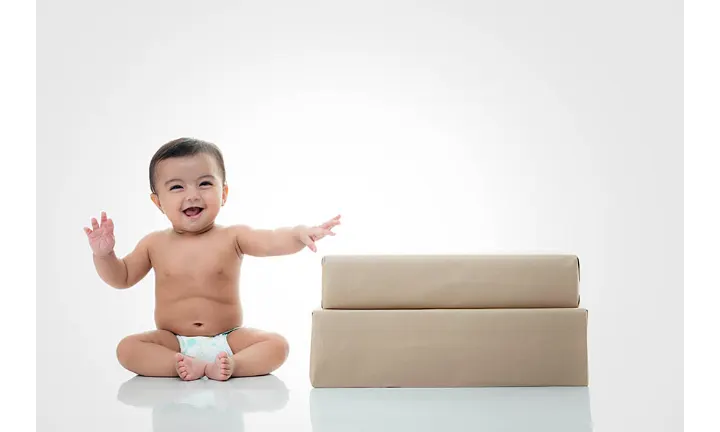Dehydration in Infants: Causes, Signs, and Treatment
Every parent strives to keep their little one healthy by doing everything possible. Yet, babies do get sick from time to time with illnesses like a fever or diarrhoea, which can lead to dehydration in newborns.
Although you can't always prevent your baby from falling sick, you can try keeping your baby away from dehydration. Read below to know more about dehydration in infants and toddlers, the signs of dehydration in newborn, toddlers and older children, and how you can treat dehydration.
What Is Dehydration?
Our bodies need water and other fluids to function properly. Over the course of a day, it's normal for your baby to lose and replenish water – sweating, crying, peeing and doing poos are all ways of losing water. That water is replaced when your little one feeds, eats or drinks.
Dehydration can occur if your baby or toddler loses more fluid than he or she takes in. This applies to adults and kids alike, but dehydration tends to happen more easily in babies and young children than in grown-ups.
Dehydration is usually easy to treat but can be serious if it isn’t dealt with immediately. This is why it’s important to recognise the signs and symptoms and get treatment as soon as possible.
Causes of Dehydration in Newborn
Dehydration can happen more easily when children have diarrhoea, vomiting or a fever, or during hot weather. Find out more about these causes of dehydration below:
Diarrhoea:
An occasional loose stool is nothing to worry about, but sometimes your baby or toddler may get diarrhoea due to a tummy bug or other illness. When diarrhoea strikes, important minerals and salts are also lost along with the water through your child's stools, and this can lead to dehydration.
Vomiting:
Many illnesses, including stomach viruses or food poisoning, can cause vomiting, which in turn can lead to dehydration. To prevent dehydration, it's important to ensure that your child is getting extra fluids. If your little one can’t keep the fluids down, call your doctor for advice on next steps.
Fever:
A fever (a high temperature of 38 degrees Celsius or higher) is your child’s natural response to infection. However, it can also lead to dehydration by causing your child to lose fluids more quickly.
Hot Weather:
Babies and young children can easily become dehydrated in hot weather. You may need to give more frequent feeds if you are exclusively breastfeeding. If you are bottle-feeding your baby, you can usually give him or her small amounts of cooled boiled water after his or her regular feeds. If your baby is already on solids, you may need to offer extra water with meals and snacks to keep your little one hydrated in hot weather. Find out more about when your baby can start drinking water. As well as making sure your child gets enough fluid during the warmer months. You should also protect him or her from the sun. Besides helping to prevent dehydration, this is important for preventing baby sunburn and other hot-weather conditions like heatstroke.
Signs of Dehydration in Newborn
The signs of dehydration in newborn or toddler can depend on the level of dehydration your baby might have.
If your child has mild to moderate dehydration, he may:
Play less than usual
Have a dry mouth
Pee less frequently (in toddlers) or have fewer than six wet diapers in a day (in babies)
Cry fewer tears
Have sunken eyes
Have sunken fontanelles (the soft spots on your baby's head)
Have looser stools if the dehydration is caused by diarrhoea, or fewer stools if the dehydration is caused by vomiting or drinking less fluid.
If your baby shows any of the above signs, call his doctor immediately. The paediatrician will advise and instruct you as to what can help treat the dehydration in your baby. He may also recommend a store-bought electrolyte solution.
If your child has severe dehydration, then he may:
Be fussy
Be excessively sleepy
Have sunken eyes
Have cold and discoloured hands and feet
Have wrinkly skin
Not have a wet diaper in an eight-hour period (in babies); not pee in a 10-hour period (in toddlers).
Dehydration fever in infants is a sign of severe dehydration too. So, if you notice any of the signs mentioned above or feel that your baby may be severely dehydrated, visit the doctor right away. Your baby may need to be rehydrated intravenously and may require hospitalisation.
Treatment of Dehydration in Infants
The treatment of dehydration in infants aims to replace the missing fluids, minerals salts and sugars. The ways of doing this can vary from simply administering a rehydration solution to the replacement of fluids via an intravenous drip. Precisely which treatment is needed depends on various factors, including your baby’s age and how severe the dehydration is. This is why it’s essential to call your doctor if your baby experiences any infant dehydration symptoms: Your child needs to be assessed so any urgent treatment, if needed, can be given.
After this, based on your child’s age and an assessment of the symptoms, you may be advised to:
Keep breastfeeding or giving your baby formula (It may help to give smaller, but more frequent feeds.)
Give small sips of extra water if your baby is on formula or has started on solid foods
Give small sips of a rehydration solution (recommended by your doctor), to replace the fluids, salts and sugars that your child needs
NOT give your child fizzy drinks or fruit juices, which can make vomiting or diarrhoea worse – if these symptoms of illness are what caused the dehydration in the first place.
When to See A Doctor?
If your child has any illness like a fever or diarrhoea, call or visit your doctor to get him treated and to avoid dehydration. If you notice any signs of dehydration in your infant, toddler or older child, contact your doctor straight away. Also notify your doctor if you feel that your kid isn't getting enough fluids or if he is vomiting and not keeping the fluids down or if he isn't eating/feeding or drinking enough.
Preventing Dehydration
Whenever your child is sick with an illness that causes fever, diarrhea, or vomiting, it's really important that they get plenty of fluids to keep them from becoming dehydrated. If your baby is under 6 months old, give them extra breast milk or formula, since water is not recommended for babies this young. If your child is showing mild signs of dehydration, a store-bought electrolyte solution can help ensure that they’re rehydrating with the correct balance of salts and sugars, especially if the dehydration is caused by diarrhea.
If you are outside on a hot summer's day with your child, stay in the shade whenever possible. You'll also want to make sure your little one is protected from the sun with a wide-brimmed hat and loose, lightweight cotton clothing with long sleeves, along with baby sunscreen. These steps can help protect your baby from sunburn and dehydration.
It's also important to keep your baby hydrated before they even start to get thirsty. So, if you're outside, ensure that you have liquids on hand.
The Bottom line
Now that you are aware of the signs of dehydration in newborns, you will be able to recognise the symptoms and help your baby get treatment in time. Do not panic if you suspect your child to be dehydrated or is not getting enough fluid. Although dehydration in infants can be scary, your doctor will know how to treat it.
Of course, prevention is better than cure! So, it's best to prevent your baby from getting dehydrated in the first place. Try getting your baby to drink enough fluids – especially if he is ill or the weather's hot.


